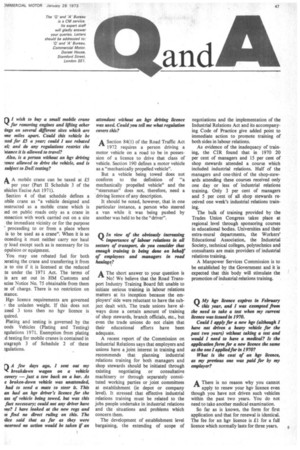Q In view of the obviously increasing Importance of labour relations
Page 49

If you've noticed an error in this article please click here to report it so we can fix it.
in all sectors of transport, do you consider that enough training is king done on behar of employees and managers in road haulage?
A The short answer to your question is
No! We believe that the Road Transport Industry Training Board felt unable to initiate serious training in labour relations matters at its inception because the employers' side were reluctant to have the subject dealt with. The trade unions have always done a certain amount of training of shop stewards, branch officials, etc., but even the trade unions do not claim that their educational efforts have been adequate.
A recent report of the Commission on Industrial Relations says that employers and unions have a joint interest in training and recommends that planning industrial relations training for both managers and shop stewards should be initiated through existing negotiating or consultative machinery or through separately constituted working parties or joint committees at establishment (le depot or company level). It stressed that effective industrial relations training must be related to the jobs people undertake in industrial relations and the situations and problems which concern them.
The development of establishment level bargaining, the extending of scope of negotiations and the implementation of the Industrial Relations Act and its accompanying Code of Practice give added point to immediate action to promote training of both sides in labour relations.
As evidence of the inadequacy of training, the CIR found that in 1970 20 per cent of managers and 15 per cent of shop stewards attended a course which included industrial relations. Half of the managers and one-third of the shop-stewards attending these courses received only one day or less of 'industrial relations training. Only 3 per cent of managers and 5 per cent of all shop stewards received one week's industrial relations training.
The bulk of training provided by the Trades Union Congress takes place at regional level through sponsoring courses in educational bodies. Universities and their extra-mural departments, the Workers' Educational Association, the Industrial Society, technical colleges, polytechnics and consultants are main providers of industrial relations training.
A Manpower Services Commission is to be established by the Government and it is expected that this body will stimulate the promotion of industrial relations training.




























































































